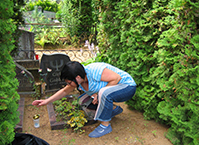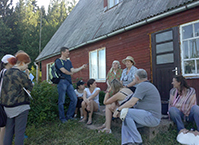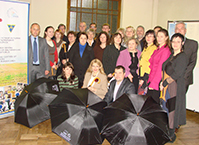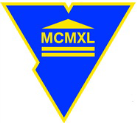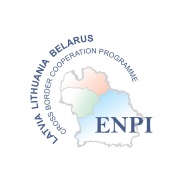About local landowner
Categories: Before war, Mikhail Hichanski
Please tell us what you remember about the local landowner?
There was Dzedzin’s estate nearby. They called it like that. There were about six houses where people who did not possess land lived there. So they were in service for that landowner. He had about twenty cows, so the building was very huge for cows, as well as for horses. He had probably about eighteen horses. There were harnesses there, a kind of carts for two horses. And…. The people put in the carts, and … There was a building in the middle of the estate, they called it “apartments”. That was a large two-storeyed wooden building with lots of rooms in it. And this landowner lived there, in fact not a landowner but a steward, because the landowner himself lived somewhere in Vilnius. He had … lots of estates in Dokshitsy region. His name was Mr. Slatvinskiy. He possessed Dzedzin’s estate, also there was his estate in Laputy, and Hniazdzilav’s estate. He rarely was coming to these estates, probably once in a quarter with other landowners by carriage. He looked around the estate and was met by the people. And here there was a steward. The common man, a sort of a foreman. First of all, he was an intelligent and literate man. There was a lot of land there, so he had to decide where to sow, how much to sow, how much of dung he needed. So that. To clean, and thresh, and tell the employees what they had to do, and milk the cows, and take the milk to Dokshitsy, and feed the horses, and make hay for the cattle for winter. This steward worked all days and nights. His surname was Pasazhytskiy. The Pasazhytskiy family had four children. Olius and Bolius were twins. They were one year younger than me. We were going to school together. Later they had Lusya and Ches, younger children. They, I mean the boys, of course, did not worked. Only later on…
Ok, I would like to ask you about the people’s attitude to the landowner, to this administrator?
The attitude was good. First of all, they were independent. In every village every farmer had a cow, almost everyone. There were may be about five or six of us only who were poor, without cows. They need to pasture them somewhere, and the land belonged to the landowner. So, the landowner let them to pasture at the separate pieces of land. And in general, they pastured the cows in the forest. I wonder why they do not pasture the cows in the forests now. All the fields were corn-clad and the meadows were mowed. The cows were turn out to the forest and they pastured them in the forest. My farther was a shepherd for one landowner, the way you go to Tumilavichy, his name was Illusha Gugnavy. So he pastured his cows, he had about…about twelve cows, I think. So he spent all the summer as a shepherd in the forest. As I didn’t go to school, me and my mother came there. And we knew the fir-tree, there… there was a bag on the tree-snag. We took it. He was usually given some food for lunch so he left us a piece of it. We took it and went home. He also pastured. So the people were independent, the landowner had no influence on them. He did not touch anybody. And then, what was interesting. So when… That was a harvest time, they were finishing gathering it. They brought all the bread-corn, delivered a national supply, and divided it between the workers. And then they celebrated ‘dazhynki’(a festival of harvest). There was … at this estate, there were lime trees planted in the shape of a Belarusian letter «П», a beautiful alley. Later on it was called a circle. A big square planted around with lilacs, and there was a ground with benches around it. The landowners used to come and have a rest there. And that steward organized ‘dazhynki’. At Rachny three men lived called Kazharachki. Ivan, Pietsya played the violin, cembalo, their father had a bass voice. He (the steward) hired those musicians. They played and … So, when the harvesting started, he came to the village, gathered the people. The people took…, the women took sickles and were glad to help. The field was huge and they cropped. He gave them food, gave out lunches, invited to the festivity. They were dancing, and having some food. That was even a very nice event. I remember I was a boy then, still bear in mind it.
Did you see it by yourself?
Yes, I saw it, that was happening right in front of my eyes.
Video
Researcher: Олег Коляго, старший преподаватель кафедры истории Беларуси, археологии и специальных исторических дисциплин ГрГУ им. Я. Купалы


